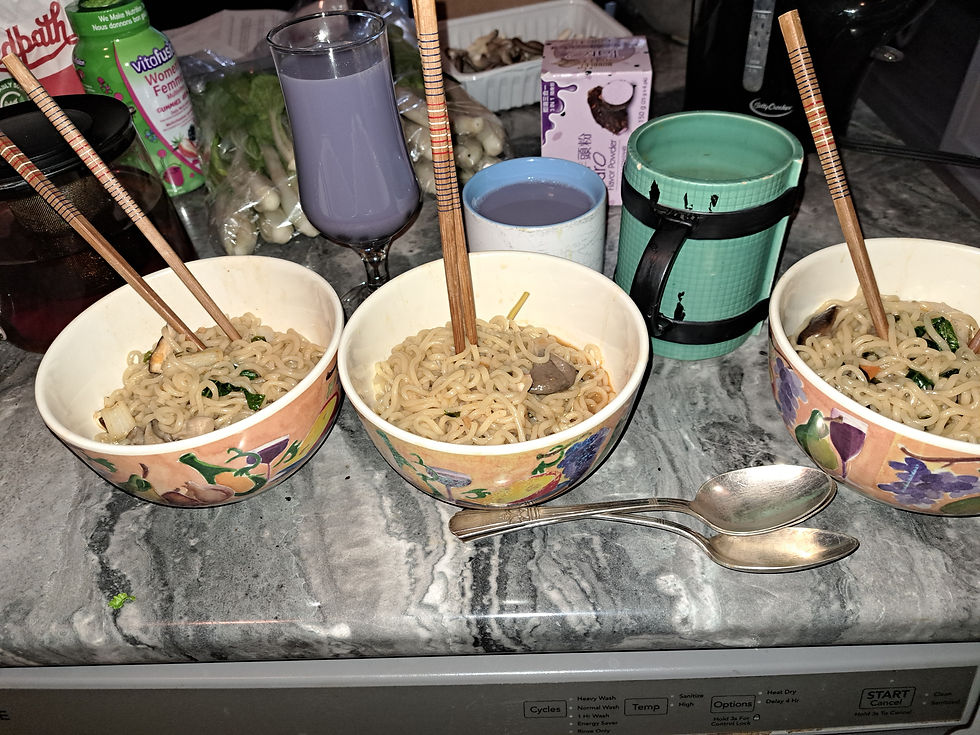Discovering new herbs!
- vitamentalitywelln
- Apr 16, 2021
- 3 min read
I am always on the hunt for exciting new herbs, and I was reminded of one today that I have never really looked into all that much, but apparently the internet felt that today this was something that I might be interested in… I have to say, the internet is not wrong in this regard! This herb has HUGE potential to do so many things!
Astragalus propinquus (syn. A. membranaceus) is also known as huang qi, Mongolian milkvetch and Radix Astragali. It is a part of the Fabaceae (pea/bean) family. Herbalists will use the root for various purposes. It has a long list of properties: it is an adaptogen, antioxidant, cardioprotective, diuretic, hepatoprotective and immunomodulator. Astragalus is a sweet tonic herb that is slightly warming. Like many sweet herbs, it is used to nourish and build. Western herbalists commonly use it for people who have low energy or who frequently get upper respiratory illnesses like colds and the flu (influenza)
I was super interested in this today because I read that astragalus root is renowned for its beneficial effects on the immune system, especially when it comes to respiratory issues. It has been shown to reduce the occurrence of common respiratory illnesses, inhibit tumor growth, and bolster immune system activity in general. Astragalus has also been shown to have antiviral activity – one in vitro study showed that polysaccharides derived from astragalus may disrupt the Epstein-Barr virus lifecycle and could possibly be beneficial for people with this virus.45 Another in vitro study showed that an extract of astragalus had “potent anti hepatitis B activity”[1].
Astragalus is a building and nourishing herb. The best results that people have had with astragalus seem to be seen when it is taken long term and in fairly high dosages. You can purchase the fresh or dried root for this. It also is an easy plant to grow in the garden; however, you’ll need to grow numerous plants over several years to get a good quantity of root. Astragalus likes sandy soil, full sun, and low nitrogen levels.
Herbal apothecaries frequently carry astragalus root that has been imported from China, but more and more herb farmers in North America are starting to grow and sell it. You can commonly find astragalus being sold as powder, whole roots, sliced roots, or roots that are cut and sifted. I like to buy the sliced roots for my soups, since they are easy to remove before serving, or the cut-and-sifted roots for use in tea/ decoction blends.
It is important to note that in TCM (Traditional Chinese Medicine), astragalus is avoided when there are signs of Heat or Yin Deficiency.
I wanted to wrap this up by sharing a new recipe that I am working on perfecting, just because it is for a chai blend that I think is incredible. It warms the body while supporting your immune system, and can be drunk daily to support immune function during the colder months of the year. One neat way that I am starting to test out for making enough tea to last me throughout the whole day is by making it in a crockpot! Just pop it in and set it on Low overnight. By doing this, your whole house smells AMAZING in the morning when you wake up! And then you have chai tea with your breakfast. Win!
Astragalus Immune-Boosting Chai Tea :
· 2 tbsp. dried orange peel
· 1 tbsp. dried gingerroot
· 1 tbsp. cinnamon chips
· 1 tsp. peppercorns
· ¼ to ½ tsp. hulled cardamom or two crushed cardamom pods
· ¼ tsp. cloves (about 3 to 5 cloves)
· 10 to 20 grams of astragalus
· 8 to 9 grams of sliced reishi mushroom (you can use less if you want, I just really like using mushrooms for my immune system!))
· 1½ quarts of water
1) Place all of the ingredients in a small saucepan. Bring to a boil, then lower the heat
2) Cover and simmer for one hour. Strain, reserving the liquid
3) Add milk and honey if desired before serving. Enjoy!






Comments